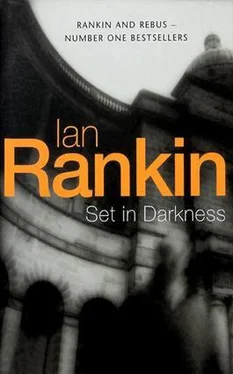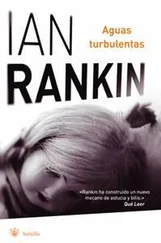‘Why?’
‘I’m wondering if he knows about your husband. Surely he’d want to be here for the funeral.’
‘He hasn’t phoned...’ She turned thoughtful again. ‘Alicia misses him.’
‘Does he ever get in touch?’
‘A card now and then: Alicia’s birthday, never misses that.’
‘But no address?’
‘No.’
‘Postmarks?’
She shrugged. ‘All over, mostly abroad.’
There was something in the way she said it that made Rebus state: ‘There’s something else.’
‘I just... I think he gets people to post them for him, when they’re on the move.’
‘Why would he do that?’
‘In case we’re trying to find him.’
Rebus sat forward a little further, cutting down the distance between himself and the widow. ‘What happened? Why did he leave?’
She shrugged again. ‘It was before my time. Roddy was still married to Billie.’
‘Had that marriage broken up before you met Mr Grieve?’ Linford asked.
Her eyes narrowed. ‘What exactly are you implying?’
‘To get back to Alasdair,’ Rebus said, hoping his tone would dissuade Linford from further queries, ‘you’ve no idea why he left?’
‘Roddy talked about him now and again, usually when a card arrived.’
‘Cards to him?’
‘No, to Alicia.’
Rebus looked around him, but someone had removed Alicia Grieve’s birthday cards. ‘Did he send one this year?’
‘He’s always late. It’ll arrive in a week or two.’ She looked towards the door. ‘Poor Alicia. She thinks I’m staying here as a sort of sanctuary.’
‘Whereas, in reality, you’re looking after her?’
She shook her head. ‘Not looking after exactly, but I am worried about her. She’s grown fragile. This is the only room you’ve been in. That’s because it’s practically the only room left that’s habitable. The rest, they fill with old papers and magazines — she won’t let them be thrown out. All sorts of rubbish, and when the room gets full, she moves into another. This room will go the same way, I suppose.’
‘Can’t her children do anything?’ Linford again.
‘She won’t let them. Refuses even to have a cleaner. “Everything’s in its place for a reason,” that’s what she says.’
‘Maybe she has a point,’ Rebus said. Everything in its place — the body in the fireplace; Roddy Grieve in the summer house — for a reason. There had to be an explanation; it was just that they couldn’t see it yet. ‘Does she still paint?’ he asked.
‘Not really. She tinkers. Her studio is at the bottom of the garden, that’s probably where she’s gone.’ Seona looked at her watch. ‘God, and I need to buy some food...’
‘You’d heard the rumours about your husband and Josephine Banks?’
The question had come from Linford. Rebus turned towards him, eyes burning, but Linford was concentrating on the widow.
‘Someone sent me a letter.’ She tugged the sleeve of her blouse down over her watch; suddenly defensive, where before she’d been opening up.
‘You trusted your husband?’
‘Completely. I know what it’s like in politics.’
‘Any idea who might have sent the letter?’
‘I threw it straight in the bin. We agreed that was the best place for it.’
‘How did Ms Banks react?’
‘She thought about hiring a detective. We talked her out of it. Anything we did would have made it all seem legitimate. We’d have been playing his game.’
‘Whose game?’
‘Whoever was spreading the rumour.’
‘You’re sure it was a he?’
‘A question of probability, Inspector Linford. Most of the people in politics are male. It’s sad but it’s true.’
‘I notice’, Rebus said, ‘there were two women standing against your husband in the selection process.’
‘Labour policy.’
‘Did you know any of the other candidates?’
‘Of course. The Labour Party’s one big happy family, Inspector.’
He smiled, as was expected. ‘I hear Archie Ure wasn’t best pleased with the result.’
‘Well, Archie’s been in politics a hell of a sight longer than Roddy. He thought it was his birthright.’
Jo Banks had used the selfsame word: birthright.
‘And the two women on the shortlist?’
‘Young and intelligent... they’ll get what they want eventually.’
‘So what happens now, Mrs Grieve?’
‘Now?’ She was staring at the pattern in the carpet. ‘Archie Ure was the runner-up. I suppose they’ll go with him.’ Staring hard at the carpet, as if some message were imprinted there.
Linford cleared his throat and turned towards Rebus, indicating that for him the interview was complete. Rebus tried to think of some brilliant final question, but came up empty.
‘Just give me back my husband,’ Seona Grieve said, leading them into the hall. Alicia was standing there at the foot of the stairs, a china cup in her hand. She’d folded a slice of bread into the cup and squashed it down.
‘I wanted something,’ she told her daughter-in-law. ‘But I’m not sure now why.’
As they left, Roddy Grieve’s widow was leading his mother up the stairs like a parent with a sleepy child.
Back at the car, Rebus told Linford: ‘You go on ahead.’
‘What?’
‘I want to stick around, do the Good Samaritan bit.’
‘Babysitting?’ Linford got in, started the engine. ‘Something tells me that’s not the whole story.’
‘I might have a word with the old woman while I’m at it.’
‘Just tell me you’re not playing Grab-a-Granny.’
Rebus winked. ‘We don’t all have young ladies lusting after us.’
The look on Linford’s face changed. He put the car into gear and drove off.
A grin spread over Rebus’s face. ‘Good on you, Siobhan, you went and dumped him.’
He went back up the path, rang the doorbell. Explained to Seona Grieve that he could spare twenty minutes or so if she wanted to pop out. She hesitated.
‘It’s just milk and bread, Inspector. We can probably manage till—’
‘Well, I’m here now, and my driver’s gone.’ He waved back towards the empty roadway. ‘Besides, the way Mrs Grieve is getting through that bread...’
He made himself comfy in the sitting room. She told him he was welcome to make tea or coffee, as long as he didn’t take milk. ‘But fair warning,’ she added, ‘the kitchen’s a bomb-site.’
‘I’ll be fine,’ he said, picking up a Sunday supplement from six months before. He heard the door close — she hadn’t bothered telling her mother-in-law, hadn’t seen the point. There was a newsagent’s a quarter of a mile away. She wouldn’t be long. Rebus waited a couple of minutes, then climbed the stairs. Alicia Grieve was standing in her bedroom doorway. She was still dressed, but wore a dressing-gown over her clothes.
‘Oh,’ she said. ‘I thought I heard someone leaving.’
‘Nothing wrong with your ears, Mrs Grieve. Seona’s just nipped out to the shop.’
‘Then why are you still here?’ She peered at him. ‘You are the policeman?’
‘That’s right.’
She shuffled past him, one hand reaching out to steady herself against the wall. ‘I’m looking for something,’ she told him. ‘It’s not in my bedroom.’
He could see into her room through the open door. It was chaotic. Clothes were piled on chairs and the floor, more spilling from the wardrobe and chest of drawers. Books and magazines, paintings stacked against the walls. There was a large patch of damp on the ceiling by the window.
She’d pushed open another door. The patterned carpet inside was faded to an almost uniform grey, where it wasn’t threadbare. Rebus followed her in. Was it a living room? An office? Impossible to tell. Cardboard boxes filled with memories and rubbish. Old letters, some not yet opened. Photograph albums spilling loose pictures across the floor. More magazines and newspapers, more paintings. Children’s toys and games from ages past. A collection of mirrors on one wall. A wigwam propped up against the far corner, its yellow canvas patched and crumbling. A child’s doll, sporting tunic and kilt, lay headless under a chair. Rebus picked it up, found the head resting in an open biscuit tin along with loose dominoes, playing cards, empty cotton reels. He fixed the head back on. The doll’s blue eyes looked neither pleased nor displeased.
Читать дальше












